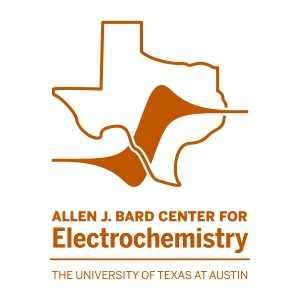April 28-30, 2025 | University of Texas at Austin
 We are pleased to invite you to the 2025 Allen J. Bard Center for Electrochemistry (Bard CEC) Workshop on Electrochemistry, taking place from Monday – Wednesday, April 28-30, 2025, at the University of Texas at Austin. The Electrochemical Society (ECS) is a workshop sponsor.
We are pleased to invite you to the 2025 Allen J. Bard Center for Electrochemistry (Bard CEC) Workshop on Electrochemistry, taking place from Monday – Wednesday, April 28-30, 2025, at the University of Texas at Austin. The Electrochemical Society (ECS) is a workshop sponsor.
This premier event brings together leading researchers, industry professionals, and students to explore the latest advancements and applications in electrochemistry. The Bard CEC Workshop has served for over a decade as a dynamic forum for scientific exchange, fostering collaboration and innovation in the fields of electrochemistry, materials science, and engineering.
Register now
Workshop details
Dates: April 28–30, 2025 (Monday – Wednesday)
Location: POB Avaya Auditorium (POB 2.302), University of Texas at Austin
About the workshop
The Bard CEC Workshop features an exciting lineup of keynote presentations, technical talks, and interactive demonstrations from world-renowned scientists representing leading universities, national laboratories, and industry leaders. Discussions will cover cutting-edge electrochemical research, with a particular focus on electron transfer mechanisms, electrochemical imaging, energy storage, and computational electrochemistry.
A special, new “Day 0” session is dedicated to students and features student-led talks and hands-on workshops designed to enhance learning and professional development. The main workshop follows with two days of expert presentations in a collegial atmosphere, fostering engagement between students, postdoctoral researchers, faculty, and professionals from industry and national labs.
Workshop highlights
- Keynote presentations by 12 distinguished experts (see our flyer for details)
- Student, postdoc, and industry talks showcasing innovative research
- Live demonstration of the new Park NX-12 SECCM/AFM system with integrated optical microscopy and fluorescence capabilities
- COMSOL Multiphysics demo session: A one-hour hands-on introduction to electrochemical modeling
- Solartron SI-6200: Coin Cell Battery Test System “guest drive” session (Solartron SI-9300R-SA: High-Current Battery Test System-Cells, small modules, Fuel Cells, Electrolysis, bench-top, distributed or cabinet based also available on display)
- Admiral Instruments battery cyclers and potentiostats on display, with guided facility tours
- Networking opportunities, including a sponsored Student Happy Hour on Monday evening
- Poster session with a networking lunch, providing an excellent platform for discussing research and forming collaborations
Speakers
- Lane Baker, Texas A&M University
- Kyoung-Shin Choi, University of Wisconsin–Madison
- Shoji Hall, University of Pennsylvania
- Long Luo, University of Utah
- Manan Pathak, BattGenie, Inc.
- Hang Ren, University of Texas at Austin
- Karsten Reuter, Fritz-Haber-Institut der Max-Planck-Gesellschaft
- Justin Sambur, Colorado State University
- Kimberly See, California Institute of Technology
- Kelsey Stoerzinger, University of Minnesota
- Anna Wuttig, University of Chicago
- Jenny Yang, University of California, Irvine
Registration Information
Register now! Click here to secure your spot.
For more details, including the full program agenda, visit the workshop website.
We look forward to welcoming you to Austin, TX, for an engaging and insightful workshop!

